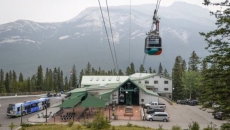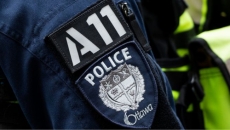It's the first thing poultry farmers in British Columbia's Fraser Valley think about in the morning, and the last thing they worry about at night, according to industry spokeswoman Amanda Brittain.
The threat is avian flu, which has resulted in the deaths of millions of birds from infection or culling, and has become a pervasive fear for farmers as infections spread, said Brittain, chief information officer with the BC Poultry Association.
She said the industry has placed itself on level "red" — the highest of three levels — in its biosecurity program as farmers fight to fend off the outbreaks, which have been triggered by migrating wild birds.
"Before anybody goes into the barn, they're changing their shoes two or three times," said Brittain.
"They're changing their clothing or putting on a biosecurity suit over their clothing. Extra precautions are taken to disinfect any vehicles that come on and off the farm, that sort of thing, because the virus is in the environment."
Canadian Food Inspection Agency data show there have been 39 B.C. outbreaks of H5N1 avian flu since Oct. 20.
Almost five million birds died or have been "humanely depopulated" in the province since the first case of H5N1 was reported in April 2022.
The agency said in a statement that 34 premises had been infected in B.C. this month, 33 of them commercial poultry operations in the Fraser Valley.
The potential threat is not restricted to the poultry industry.
Provincial health officer Bonnie Henry this month urged poultry workers to get their flu shots, since there is concern that a rare human infection of avian flu could cause the virus to mix with human influenza and mutate into something more contagious among people.
Such a development has long been feared among scientists worried about where the next pandemic illness will come from.
Agriculture Minister Pam Alexis said the province has been working with farmers and the CFIA on preventing the spread of avian flu, including a $5-million program launched in the spring to help improve biosecurity at farms.
But Alexis said the risks of avian flu spreading locally is always present because the Lower Mainland and the Fraser Valley are on the Pacific Flyway, a major north-south path for migratory birds in North America.
"It's migratory birds that defecate on or close to farms," Alexis said. "And that's brought in through various means, perhaps through the workers or the birds themselves.
"This is the reality that we're living in right now, and so prevention and preparation is really the key."
BC United MLA Ian Paton, who is also the shadow minister for agriculture, said the NDP provincial government should be doing more.
"This means listening to the concerns of our poultry producers, rapidly providing them with the necessary resources and support, and implementing strategies to prevent further outbreaks," Paton said in a statement.
Brittain likened the situation to another COVID-19 pandemic for farmers, who have now isolated themselves from each other to avoid spreading H5N1, resorting to Zoom and other online platforms to meet and discuss how to handle the outbreaks.
Physical visits to farms are extremely limited, with only feed trucks, egg pickups and veterinary visits being allowed, Brittain said.
"Almost no one goes into the barn other than the farmer themselves or a vet," she said.
She said that because chickens in a barn could not be separated, "we need to protect them by trying to stay away from other farms."
"No farmer is going to visit other farms right now and then going back to their home farm. That's not happening."
The situation is similarly dire among wild birds.
The Wildlife Rescue Association of BC, a non-profit animal rescue group, said it had received at least 100 calls from the public since Oct. 1 about sightings of possible infected wild birds, showing symptoms such as the inability to stand or fly.
Association support centre manager Jackie McQuillan said the situation was straining the group's 20 or so full-time staff and 200 volunteers.
McQuillan said most infections were among geese and ducks, although other birds can also be infected. The CFIA says H5N1 has been "sporadically detected" in Canada in mammals including raccoons, skunks, foxes, cats and dogs.
McQuillan said the number of avian flu cases was putting everyone and the association's finances under duress.
"When you think about all of the extra personal protective equipment that's required, the extra mileage that people are spending to drive out to the outlying areas for rescues, the extra time that we spend on the phone fielding and managing those calls, (it) has definitely been a massive strain on our organization," she said.
Brittain said the most difficult part for some farmers is that they recently had to deal with another source of catastrophic loss, the 2021 atmospheric river flooding that killed about 630,000 chickens in the Sumas Prairie.
But despite the difficulties, Brittain said no one in the industry has expressed a desire to exit the sector.
"Farming is a lifestyle," she said. "It's not a job. They do this because they love it. They love taking care of animals, which is why it hits them hard when they lose the flock to a disease. But they want to keep doing this job."






